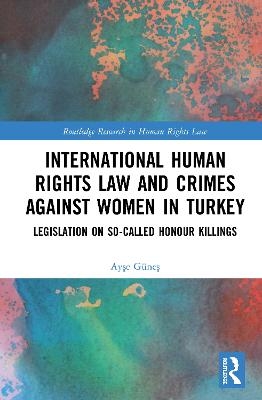
International Human Rights Law and Crimes Against Women in Turkey
Legislation on So-Called Honour Killings
Seiten
2020
Routledge (Verlag)
978-0-367-55106-3 (ISBN)
Routledge (Verlag)
978-0-367-55106-3 (ISBN)
This book evaluates the effectiveness of current international human rights law, and in particular the recent Istanbul Convention, in eradicating so-called honour killings in Turkey. It will be a valuable resource for academics, researchers and policy-makers in the areas of international human rights law and feminist legal theory.
This book evaluates the effectiveness of current international human rights law, and in particular the recent Istanbul Convention, in eradicating so-called honour killings in Turkey.
So-called ‘honour killings’ have become an issue of concern for the international community. In Turkey, in particular, the practice still exists despite the adoption of the relevant human rights instruments. The book argues that the improvement of the status of women in Turkey in accordance with gender equality as well as the application of the principle of state due diligence, both requirements of the Istanbul Convention and international human rights law, are fundamental means towards eradicating the killing of women in the name of ‘honour’. Using feminist approaches, in particular the intersectionality approach, the study looks at the application of such standards as well as the current obstacles. Through such a lens, the study discusses the strengths and weaknesses of the Turkish Constitution, Turkish Civil Code, Turkish Penal Code and Law to Protect Family and Prevent Violence Against Women and questions the judicial approach to the implementation of the women’s right to life. It identifies the lacunae in the Turkish legislation that allow inadequate legal protection for women and the inconsistency of the judicial approach to the definition of the so-called honour killings in the judgements. The study then recommends some concrete amendments to the relevant legal provisions in order to better reflect the international framework and the feminist approaches.
The book will be a valuable resource for academics, researchers and policy-makers in the areas of international human rights law and feminist legal theory.
This book evaluates the effectiveness of current international human rights law, and in particular the recent Istanbul Convention, in eradicating so-called honour killings in Turkey.
So-called ‘honour killings’ have become an issue of concern for the international community. In Turkey, in particular, the practice still exists despite the adoption of the relevant human rights instruments. The book argues that the improvement of the status of women in Turkey in accordance with gender equality as well as the application of the principle of state due diligence, both requirements of the Istanbul Convention and international human rights law, are fundamental means towards eradicating the killing of women in the name of ‘honour’. Using feminist approaches, in particular the intersectionality approach, the study looks at the application of such standards as well as the current obstacles. Through such a lens, the study discusses the strengths and weaknesses of the Turkish Constitution, Turkish Civil Code, Turkish Penal Code and Law to Protect Family and Prevent Violence Against Women and questions the judicial approach to the implementation of the women’s right to life. It identifies the lacunae in the Turkish legislation that allow inadequate legal protection for women and the inconsistency of the judicial approach to the definition of the so-called honour killings in the judgements. The study then recommends some concrete amendments to the relevant legal provisions in order to better reflect the international framework and the feminist approaches.
The book will be a valuable resource for academics, researchers and policy-makers in the areas of international human rights law and feminist legal theory.
Ayşe Güneş is Lecturer at the Department of Political Science and Public Administration, Bartın University, Turkey.
1. Introduction
2. Theoretical Framework: Analysis of ‘Honour Killings’ in the Context of Feminist-Legal Theory
3 Analysis of Honour Killings within the Context of International Legislation: From CEDAW to the Istanbul Convention
4 The Challenges of the Turkish Legislation on ‘Honour Killings’ Prior to Ratification of the Istanbul Convention
5 Legal Implications of Turkey’s Accession to the Istanbul Convention: Challenges to Preventing ‘Honour Killings’
6 Recommendations and Conclusions
| Erscheinungsdatum | 15.01.2021 |
|---|---|
| Reihe/Serie | Routledge Research in Human Rights Law |
| Verlagsort | London |
| Sprache | englisch |
| Maße | 156 x 234 mm |
| Gewicht | 548 g |
| Themenwelt | Recht / Steuern ► EU / Internationales Recht |
| Recht / Steuern ► Öffentliches Recht ► Völkerrecht | |
| Sozialwissenschaften ► Politik / Verwaltung | |
| Sozialwissenschaften ► Soziologie ► Gender Studies | |
| Sozialwissenschaften ► Soziologie ► Spezielle Soziologien | |
| ISBN-10 | 0-367-55106-3 / 0367551063 |
| ISBN-13 | 978-0-367-55106-3 / 9780367551063 |
| Zustand | Neuware |
| Informationen gemäß Produktsicherheitsverordnung (GPSR) | |
| Haben Sie eine Frage zum Produkt? |
Mehr entdecken
aus dem Bereich
aus dem Bereich


